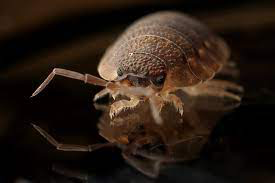On October 19th, at the University Mediterranean Center in Nice, Dr. Pascal Delaunay shared his expertise on bedbugs during an information meeting. We attended to fully understand these insects, from their behavior to their eradication.
The cimex lectularius—this term might not mean anything to you, yet these creatures have been making headlines in recent weeks. The resurgence of bedbugs in France is causing anxiety and panic. They are even being talked about on foreign news channels. These tiny creatures, the size of an apple seed , can indeed cause quite a disturbance.
And to the great misfortune of some, these cold-blooded insects, more or less red in color, are “highly specialized in biting humans”. In short, their favorite food is human blood.
They attack their host during periods of rest, preferring quiet and darkness, so it’s true that their favored locations are beds and sofas. However, they are not capable of biting through clothing; only exposed skin is accessible to them.
1 in 10 households infested
In France, according to the National Health Security Agency, more than one household in 10 was infested between 2017 and 2022. “When looking at old documents, we realize that bedbugs have always existed; humans have lived with them for thousands of years,” reveals entomologist and parasitologist Pascal Delaunay. They were already well-known to the Romans and Persians and shared life with humans during ancient Egypt.
Their presence decreased during the post-war economic boom known as the Trente Glorieuses before being reintroduced to wealthy countries from the 1990s onward, due to globalization characterized by the rise in global circulation flows. However, no link has been established with climate change.
Since October 1st, thanks to the decree of July 29, 2023, they are considered genuine pests. Previously, they were not, because they do not transmit diseases. However, while the only physical symptoms manifest as itching, the consequences for mental health can be far more important.
Some keys to getting rid of them
The specialist keeps repeating it: the key to getting rid of them when you suspect you have them in your home is to see the bedbugs, to spot and quantify them. This should be done before engaging in any control strategy and spending large sums of money.
The recommendations are not to use chemical insecticides individually, whether purchased in supermarkets or pharmacies. The first instinct, once these six-legged pests are identified, is to tidy up and clear the infested area.
Then, there are multiple solutions: wash what can be washed at 60°C, dry in a dryer on a hot setting, use steam to clean corners and upholstery, clean corners and fabrics with a brush to remove what is not visible before cleaning the floor, vacuuming, and disposing of what has been vacuumed.
Note that white vinegar and baking soda do not kill bedbugs, despite some widespread beliefs. It is recommended to apply these methods at least twice a week for three weeks.
Measures implemented by the city of Nice
The city of Nice claims to have addressed this public health issue since 2021. A single contact point set up at the Maison de l’Habitant allows affected citizens to be informed, advised, and redirected if necessary.
A financial assistance of 175 euros is offered by the municipality to help finance the rental, purchase of control materials, or the intervention of a specialized company. It can be requested within six months from the Health Security Agency and is granted after an inspection visit and providing certain supporting documents.
If you are affected, do not hesitate to visit 6 Allée Philippe Seguin in the Liberation district to receive the help you need. The phone line is open at 04 97 13 55 11 from Monday to Friday. The hours are as follows:
- Monday: 8:30 a.m. – 12:30 p.m. / 1:30 p.m. – 5:00 p.m.
- Tuesday: 1:30 p.m. – 5:00 p.m.
- Wednesday: 8:30 a.m. – 12:30 p.m. / 1:30 p.m. – 5:00 p.m.
- Thursday: 8:30 a.m. – 12:30 p.m. / 1:30 p.m. – 5:00 p.m.
- Friday: 8:30 a.m. – 12:30 p.m. / 1:30 p.m. – 3:00 p.m.


